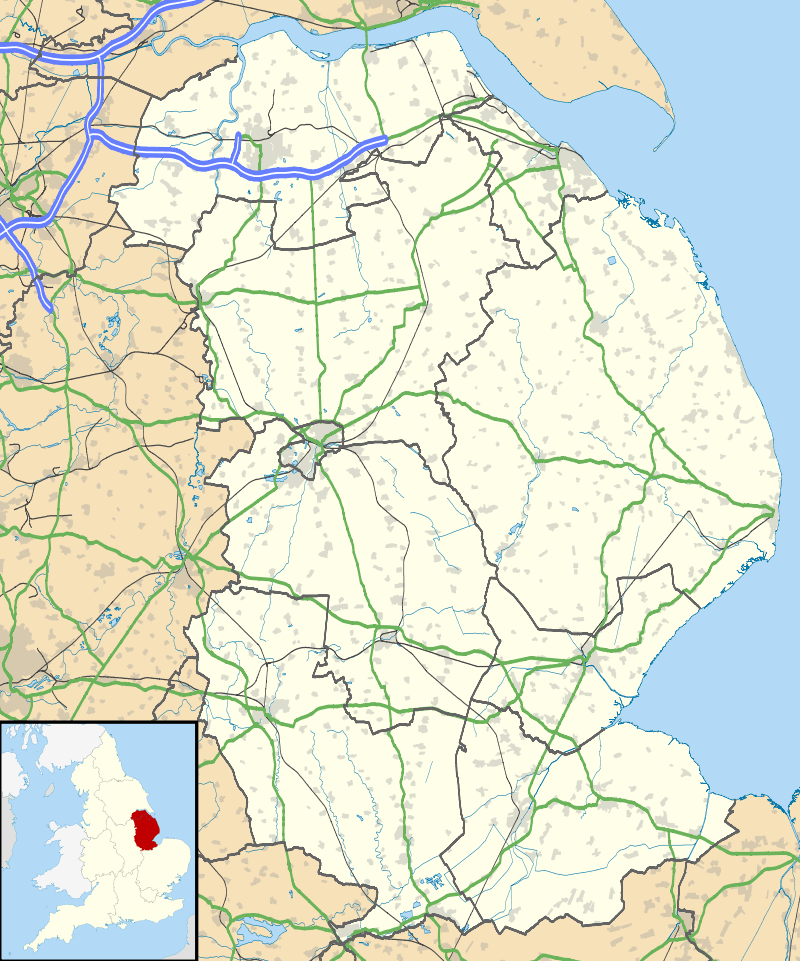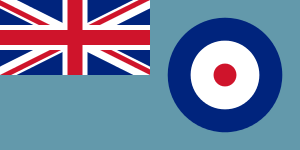RAF Swinderby
| RAF Swinderby | |||||||||||||||||||
|---|---|---|---|---|---|---|---|---|---|---|---|---|---|---|---|---|---|---|---|
|
Haec porta moenia viri (Here are the gates, the men are the walls) | |||||||||||||||||||
 RAF Swinderby in April 1941, looking south-south-west | |||||||||||||||||||
| IATA: none – ICAO: none | |||||||||||||||||||
| Summary | |||||||||||||||||||
| Airport type | Military | ||||||||||||||||||
| Owner | Ministry of Defence | ||||||||||||||||||
| Operator | Royal Air Force | ||||||||||||||||||
| Location | Swinderby, Lincolnshire | ||||||||||||||||||
| Built | 1939 | ||||||||||||||||||
| In use | 1940-1995 | ||||||||||||||||||
| Elevation AMSL | 62 ft / 19 m | ||||||||||||||||||
| Coordinates | 53°08′49″N 000°40′16″W / 53.14694°N 0.67111°WCoordinates: 53°08′49″N 000°40′16″W / 53.14694°N 0.67111°W | ||||||||||||||||||
| Map | |||||||||||||||||||
 RAF Swinderby Location in Lincolnshire | |||||||||||||||||||
| Runways | |||||||||||||||||||
| |||||||||||||||||||
Royal Air Force Swinderby or more simply RAF Swinderby was a Royal Air Force station airfield opened in 1940, one of the last of the stations completed under the RAF's expansion plans started in the 1930s. It was built near the village of Swinderby, Lincolnshire just off the south east side of the A46 (the Fosse Way) between Newark-on-Trent, Nottinghamshire and Lincoln, Lincolnshire, England.
History
Under the command of No.1 Group RAF, Swinderby came under the auspices of RAF Bomber Command and housed several RAF Bomber Squadrons, among others No. 300 Polish Bomber Squadron and No. 301 Polish Bomber Squadron, initially flying the Fairey Battle, then Vickers Wellington. Other squadrons operated aircraft, such as the Handley Page Hampden.
In the 1950s it was the home of No. 8 FTS, converting trainee pilots to de Havilland Vampires. In 1956 it hosted a brief experiment to keep all the flying training to wings stage straight through on one base. This was abandoned after a month due to the obvious danger of collisions in the circuit between the Vampires and the much slower piston engined Percival Provost basic trainers.
.jpg)
.jpg)
.jpg)


In 1964 RAF Swinderby changed its role to that of recruit training when No.7 School of Recruit Training, formerly at RAF Bridgnorth, opened at RAF Swinderby. It became responsible for the basic training of all male enlisted personnel prior to their trade training, in August 1964 intake 7/46 was the first pass out parade at RAF Swinderby. No.7 School of Recruit Training changed to RAF School of Recruit Training in 1976 when all female personnel initial training was carried out at RAF Swinderby as well as male. Females were still trained at RAF Hereford in 1976 and in 1989 the very first integrated Flight (i.e. male and female recruits) passed out in January at RAF Swinderby, this consisted of A Flight and B Flight of 13 Flight joining in November 1988. In July 1993 No.1 Squadron 6 Flight was the final pass out parade before the RAF School of Recruit Training moved to RAF Halton.[1][2][3][4][5][6][7]
A live LP recording of a passing out parade was made in 1973, featuring the Midland Band of the Royal Air Force. It included all the commands and sounds of the parade.[8]
Current use
In 1995 the station was put up for sale, where the land was purchased by Cemex for commercial mining. However, Cemex continue to rent the land to International Antiques & Collectors Fairs five times a year for the Swinderby Antiques Fair.
In 2013 the hangars and the air traffic control tower remain in evidence along with acres of concrete runways and taxiways but most of the other buildings on the technical site have been demolished.
The domestic site has been developed as the new village of Witham St Hughs with only the former Officer's Married Quarters and Airmen's Married Quarters remaining. The new village hall has an information board giving the history of RAF Swinderby.
In 2014 only 2 hangars remain, but the control tower has now been demolished.
On 10 May 2014 a memorial was dedicated to all those Servicemen and Servicewomen who served at RAF Swinderby from 1940 to 1993. It is situated by the modern village hall, adjacent to the information board and the bench "Remembering No. 300 & No. 301 Polish Squadrons who served with the Royal Air Force at RAF Swinderby during WW II".[9]
Squadrons
| Squadron | Equipment | From | To | To | Notes |
|---|---|---|---|---|---|
| No. 50 Squadron RAF | Handley Page Hampden | 20 July 1941 | 26 November 1941 | RAF Skellingthorpe | [10] |
| No. 300 Squadron RAF | Fairey Battle Vickers Wellington IC | 22 August 1940 | 18 July 1941 | RAF Hemswell | [11] |
| No. 301 Squadron RAF | Battle Wellington IC | 29 August 1940 | 18 July 1941 | RAF Hemswell | [11] |
| No. 455 Squadron RAF | Hampden | 6 June 1941 | 8 February 1942 | RAF Wigsley | Formed here.[12] |
References
Citations
- ↑ Jefford 1988, p. 00.
- ↑ Halpenny 1981, p. 180.
- ↑ Halpenny 1981, p. 181.
- ↑ Halpenny 1981, p. 182.
- ↑ Halpenny 1981, p. 183.
- ↑ Halpenny 1981, p. 184.
- ↑ Halpenny 1981, p. 185.
- ↑ Passing Out Parade, The Newcomers, Swinderby Style, Record Number CS 7095
- ↑ "RAF Swinderby Memorial Dedication".
- ↑ Jefford 1988, p. 41.
- 1 2 Jefford 1988, p. 84.
- ↑ Jefford 1988, p. 93.
Bibliography
- Halpenny, B.B. Action Stations: Wartime Military Airfields of Lincolnshire and the East Midlands v. 2. Cambridge, Cambridgeshire, Patrick Stephens Ltd, 1981. ISBN 0-85059-484-7.
- Jefford, C.G, MBE,BA ,RAF (Retd). RAF Squadrons, a Comprehensive Record of the Movement and Equipment of all RAF Squadrons and their Antecedents since 1912. Shrewsbury, Shropshire, UK: Airlife Publishing, 1988. ISBN 1-84037-141-2.
External links
| Wikimedia Commons has media related to RAF Swinderby. |
- Official RAF History of Swinderby
- Photos of the base today
- More Photos
- Photos of airfield buildings in 2009

